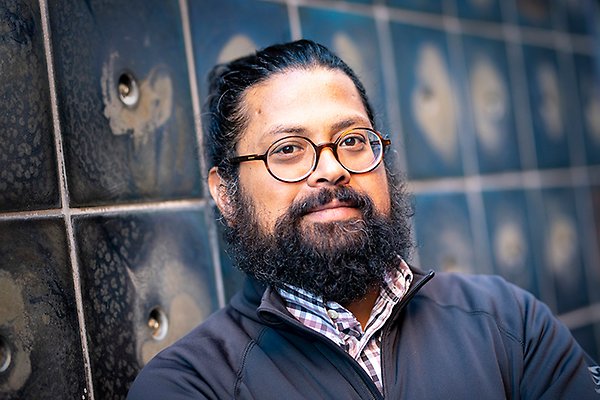Raazesh Sainudiin tells about his research in data science

Raazesh Sainudiin. Foto: Mikael Wallerstedt.
Raazesh Sainudiin was born in 1973 in Chennai, India. He completed his dissertation at Cornell University in the United States. It is entitled Machine interval experiments and deals with how humans make decisions with consideration of the decision process of computers.
In 2006, he was awarded a post doctoral position at the University in Oxford within mathematical population genetics. At the time, he studied how individuals are linked to each other genetically and how these links influence heredity in terms of illnesses.
When Raazesh came to Sweden and Uppsala University in 2017, his task was to establish collaborations within data science among industry and academia. During his research career, Raazesh’s interest in data science has included completely different fields, such as population genetics, behavioural ecology, epidemiology, statistical physics, terrorism, extremism, and a few other fields.
Raazesh, who is fluent in Tamil, Hindi, and English, sees mathematics as his fourth language.
“Mathematics is a fantastic opportunity if you want to understand the world. It is a language that can be used to map reality. You can also use it together with computer science and statistics to solve relevant problems, such as issues facing the private sector,” says Raazesh.
He is now involved in a project funded by the Swedish Research Council. In collaboration with religion historian Mattias Gardell and sociologist Simon Lindgren, he is mapping how ideologies spread in social media.
“It can be described as mathematical theology, since the spread of different ideologies in many cases has religious overtones, either because the ideology is actually a religion or because groups borrow terminology and concepts from established religions.”
Raazesh is associated with the industry network Combient with around 30 of the Nordic countries’ largest companies and their shared AI hub, Combient Mix.
“In 2019, I was involved in starting Combient Competence Centre for Data Engineering Sciences, which offers Uppsala students the opportunity to collaborate with the private sector within relevant industrial questions. Sweden has an acute need of more talented mathematicians, and there are incredible opportunities to explore data science
in-depth.”
Data science or big data
Big data is the term for the incredible amounts of data that have become increasingly important for businesses in recent years. By linking data from different sources and analysing them, researchers can gain a more comprehensive picture than previously and can use the information to improve decision-making. As a data scientist, you need to have an understanding of mathematics, statistics, and computer science.
